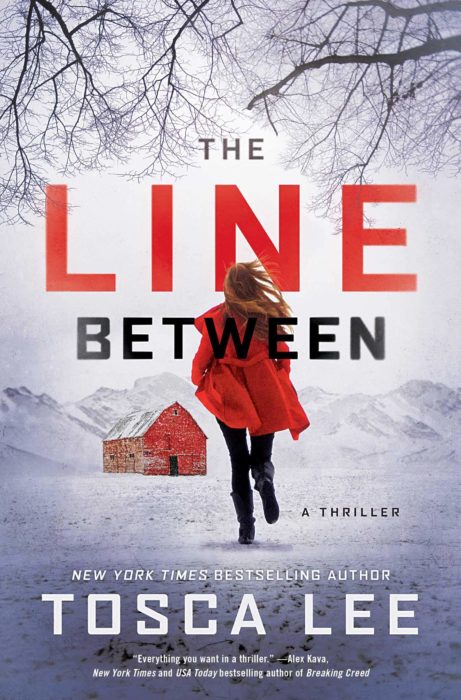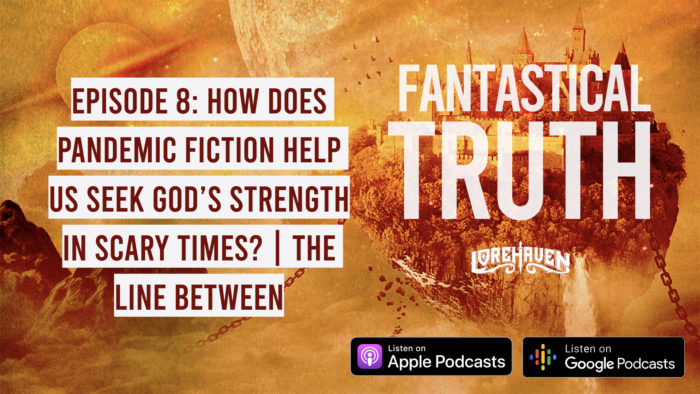8. How Does Pandemic Fiction Help Us Seek God’s Strength in Scary Times? | The Line Between
Podcast: Play in new window | Download (Duration: 42:08 — 39.9MB) | Embed
In episode 7, we promised our next episode would focus on Frank E. Peretti’s This Present Darkness.
But first, a word from our biggest news of 2020.
In this episode, E. Stephen Burnett and Zackary Russell share a few “favorite” pandemic stories, including the recent Planet of the Apes film trilogy and Tosca Lee’s 2019 novel The Line Between.
These stories can actually help Christians prepare our imaginations for these trials—or even worse suffering.
Lorehaven reviews The Line Between
These truth glimpses give The Line Between surprising heart-warmth amongst the chill, while its road-trip quest drives fast through mad territory and never once feels bogged down in snowbanks. Even by the finale, we get hints that our heroes have learned that yes, sometimes you must stay preserved from a world gone mad, but for the greater mission of helping others in that world. As Aleksandr Solzhenitsyn wrote, you can’t simply separate from evil people—not even cultists—in order to avoid evil. That very line between evil and good cuts through every human heart.
- Read the full review in Lorehaven magazine’s spring 2019 issue.
- Read our interview with bestselling novelist Tosca Lee.
- Subscribe free to get every issue.
Quotes and notes
- In 2017, Mark Carver wrote at Speculative Faith, “It’s interesting how the biggest threat to human existence rarely gets news coverage. It’s not North Korea or global warming or white privilege; it’s disease.” (Down With the Sickness, Sept. 20, 2017)
- Big lessons of pandemics: we’re not in control. These events challenge us to ask ourselves, “Where is my hope?”
- We blame politicians or countries or each other, or downplay the problem versus panicking, and/or buy into conspiracy theories—all because doing so gives us a sense of control.
- Christians may be material “preppers,” but we must always be preppers for times of suffering.
Most of us don’t give focused thought to evil and suffering until we experience them. This forces us to formulate perspective on the fly, at a time when our thinking is muddled and we’re exhausted and consumed by pressing issues. Readers who have “been there” will attest that it’s far better to think through suffering in advance.
—Randy Alcorn, If God is Good, page 14
For I consider that the sufferings of this present time are not worth comparing with the glory that is to be revealed to us. For the creation waits with eager longing for the revealing of the sons of God. For the creation was subjected to futility, not willingly, but because of him who subjected it, in hope that the creation itself will be set free from its bondage to corruption and obtain the freedom of the glory of the children of God. For we know that the whole creation has been groaning together in the pains of childbirth until now. And not only the creation, but we ourselves, who have the firstfruits of the Spirit, groan inwardly as we wait eagerly for adoption as sons, the redemption of our bodies. For in this hope we were saved. Now hope that is seen is not hope. For who hopes for what he sees? But if we hope for what we do not see, we wait for it with patience.
—Romans 8:18–25
When he opened the fourth seal, I heard the voice of the fourth living creature say, “Come!” And I looked, and behold, a pale horse! And its rider’s name was Death, and Hades followed him. And they were given authority over a fourth of the earth, to kill with sword and with famine and with pestilence and by wild beasts of the earth.
—Revelation 6:7–8 (emphasis added)
Action points
- Worship: we follow a Savior who touched the sick but didn’t get sick.
- Serve: help your neighbors who cannot take care of themselves, or shouldn’t go out in public. Who do you know who is at high risk if they get infected? How can you serve them?
- Pray: for revival, not just a cure.
- Evangelism: share the Power Over Fear tool.
Next on Fantastical Truth
This month we’re releasing our next Lorehaven issue. Its cover story explores our favorite Christian-made fantastical novels. This includes that classic of the 1980s, Frank Peretti’s This Present Darkness, a classic (especially for Christians!) supernatural thriller that asks: What If the Armies of Hell Tried to Invade Your Hometown? Lorehaven’s review chief, Austin Gunderson, will join the podcast to explore the Peretti-verse with us.































Share your thoughts about this podcast episode